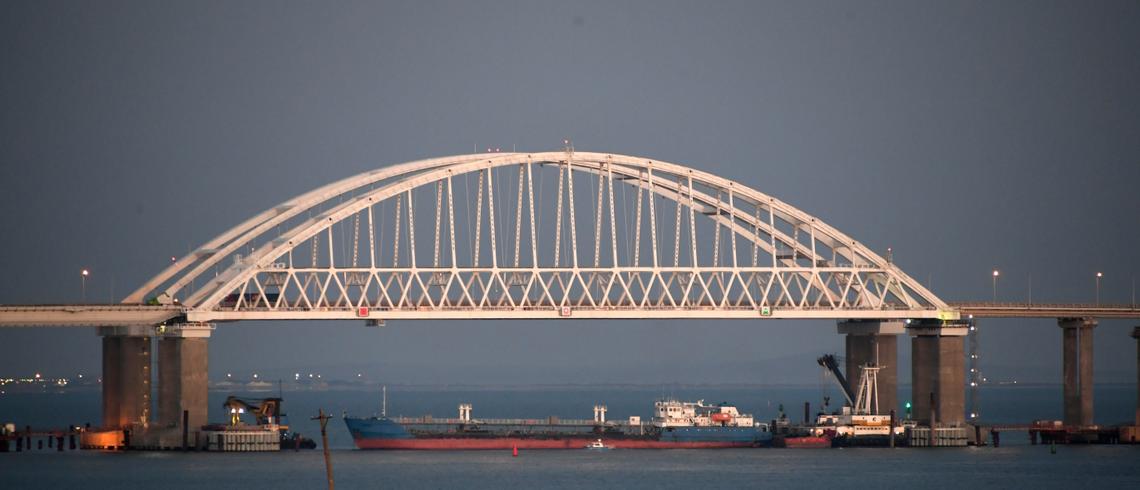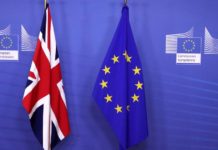Russian seizure of Ukrainian vessels sinks bilateral ties
Igor Serebryany

What’s behind the latest incident in the Strait of Kerch, and is Russia’s seizure of Ukrainian ships a product of negligence, misunderstanding or deliberate provocation?
Russian warships fired on and seized three Ukrainian small vessels in the Black Sea on Sunday, ramming one of them after a 12-hour “cat and mouse” game that Moscow described as “dangerous manoeuvring.”
The three Ukrainian ships were en route from the Black Sea port of Odessa to the Azov Sea port of Mariupol.
The Ukrainian boats were then escorted to the Crimean port of Kerch. Three Ukrainian crewmen were lightly injured in a collision, the FSB admitted.
The climax of the naval “battle” was videotaped and uploaded on the internet by the Russian crew itself.
The video shows at least two Russian ships ramming the Ukrainian tugboat, while one of the Russian captains gave profanity-laced commands to “ram these bastards.”
Retired naval officer Nikolai Livshits who served in Russia’s Azov border warship in the late 1990s, tells TRT World that the actions of the Russian boats were “absurd” and might be a “deliberate provocation.”
“They acted cack-handed, all thumbs and no fingers. All that looks like they acted on the captain’s whim. According to the naval regulations, a border services ship must first fire warning shots. Then the border ship can land troopers aboard the alien vessel, conduct a search and–if the violations are confirmed –demand its crew follow the border ship. But no regulations stipulate physical ramming,” he says.
An expert in maritime law, Mikhail Voitenko also strongly believes that the incident in the Strait of Kerch could result from a disrupted chain of command or lack of a “plan B” in the Russian Navy and border service.
“What I see from the video convinces me that the Russian ship’s captain acted erratically, as if he had momentarily lost his mind. Perhaps he wanted to become a ‘hero’ or just had a bad day. It also looks like the Russian navy men were uncertain what they must do when they detected Ukrainian ships approaching the Kerch channel from the unexpected angle, and acted on their own, actually like in panic,” the Thai-based expert says after analysing the video.
Whatever the cause, the latest incident is timely for Ukrainian President Petro Poroshenko, who faces elections scheduled on March 31 with no guarantee of success, the head of Ukraine’s Analytical Center, Alexander Okhrimenko, says.
“The developments have been so favourable for Poroshenko –and similarly unfavourable for his political opponents –that nearly all Ukrainian observers agree: the incident was staged on purpose. What’s more, it seems like Moscow understands the real intentions of Ukraine and decided to play along with Poroshenko,” he suggested.
How Sunday’s incident has been advantageous for Poroshenko is pretty obvious.
Ukrainian President Petro Poroshenko signed a decree to introduce martial law for 60 days, a statement on his website said, though it needs parliamentary approval to come into force.
The Parliament was expected to debate the decree later on Monday though a televised session of a parliamentary committee unanimously supported it.
All political activities, including the presidential election, stand suspended and campaigning can restart only 100 days after the state of emergency is lifted.
This is a safe bet for Poroshenko, the expert believes.
Kiev had neither introduced martial law during the conflict in Donbass nor even when Russian troops entered Crimea in 2014.
This is why the current move to declare martial law looks highly suspicious, Okhrimenko says. “In sheer military terms, the Sunday incident has been negligible. Three small boats are unable to change the military balance nor they can bear any threat to Russian security even if they enter the Sea of Azov on a wrong course. Thus, the Kremlin has played into the hands of Poroshenko, deliberately or by some miscalculation,” the Ukrainian expert points out.
Even though no experts doubt that Ukraine will introduce martial law, they mostly agree that the measures would be predominately political rather than military.
The director of the New Ukraine Research Institute in Kiev, Andrei Yermolayev, foresees that the martial law regime will be mild in essence and limited geographically.
He cites earlier incidents between Russian and Ukrainian vessels in the disputed seas.
“This is not the first time Russia has seized Ukrainian ships. The only difference is, that previously they were fishing boats, while this time they belong to Ukraine’s Navy. This is why Ukraine considers Sunday’s incident an act of military aggression not piracy, as before,” he says.
Despite neither country ever formally denouncing the 2003 agreement over the Sea of Azov status, the document was nullified following the annexation of Crimea by Russia in 2014.
The Azov agreement is based on a very different geopolitical configuration. From 2014 on, Ukraine quotes the agreement’s clauses to justify the presence of its vessels in the disputed waters, while Russia points at the factual state of affairs.
The latter has been illegitimate from the international law point of view, Yermolayev stresses.
However, Moscow may use martial law in Ukraine as another “justification” to tighten its economic noose on Kiev’s neck, he predicts.
“Russia may lock all Ukrainian ships in the Sea of Azov, thus blocking all sea traffic to and from the port of Mariupol. Of course, the production of Mariupol steelworks could be redirected by rail to the Odessa port, but it would add extra logistic efforts, extra expenses and, as a result, make Ukrainian export more expensive. Russia can also shut its gas pipeline running through Ukraine, making the upcoming ‘wartime’ winter in that country really harsh because even now the Ukrainian cities suffer from energy and heat shortages,” he says.
The further developments depend on what the martial law’s particulars are, says the director of Moscow’s Institute of Peacekeeping and Conflictology, Denis Denisov.
“The status of the Sea of Azov has currently been very similar to that of the other disputed bodies of water, such as the South China Sea, Aegean Sea and Falkland Isles, to name a few. But in the case of the Russia-Ukraine agreement over Azov, we observe legal nonsense,” he says.
No agreement could exist if it is obeyed by one party only. This is the same nonsense as “unilateral friendship,” Denisov explains.
“Moscow and Kiev will be better off to renew the agreement to render it fit for the realities of the post-2014 period. But Kiev insists on the existing document because denunciation of the 2003 treaty would automatically legitimise Russian claims on Crimea,” Denisov stresses.
Still, all experts in both Kiev and Moscow rule out the possibility of direct military confrontation between Russian and Ukrainian forces, be it on sea or on land, as a result of the recent incident.
“If any party opens fire instead of ramming, it would constitute the gravest violation of the Geneva Convention with unpredictable consequences. So Russian and Ukrainian vessels will likely continue to ram each other, at most, but with no shots fired,” Denisov says.
“Meanwhile, the latest incident can be used to introduce a new round of anti-Russian sanctions by the West, which the US and EU would only be happy to announce,” Gleb Bogush, professor of international law in Moscow State University, tells TRT World.










